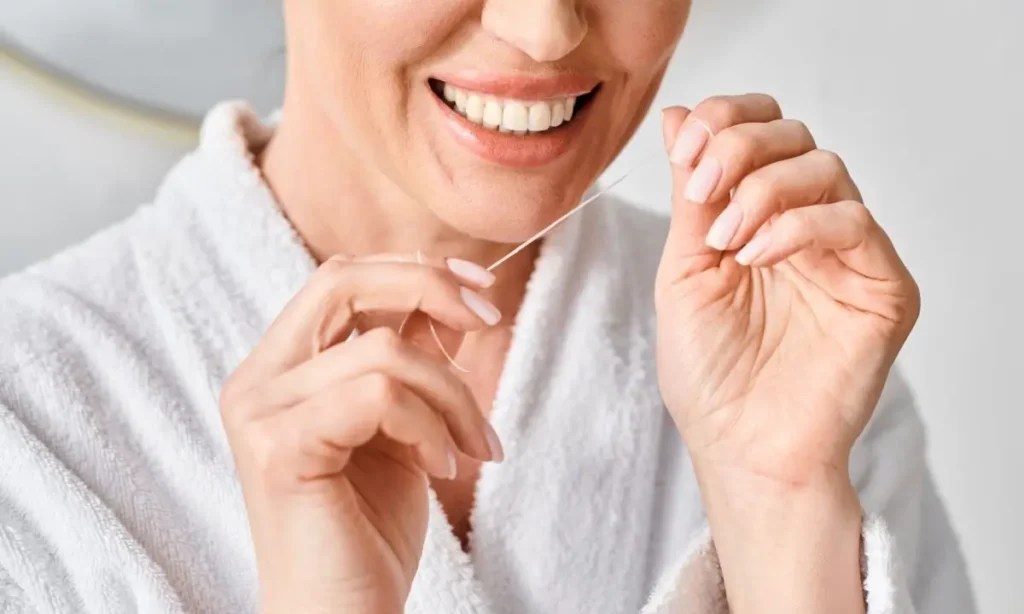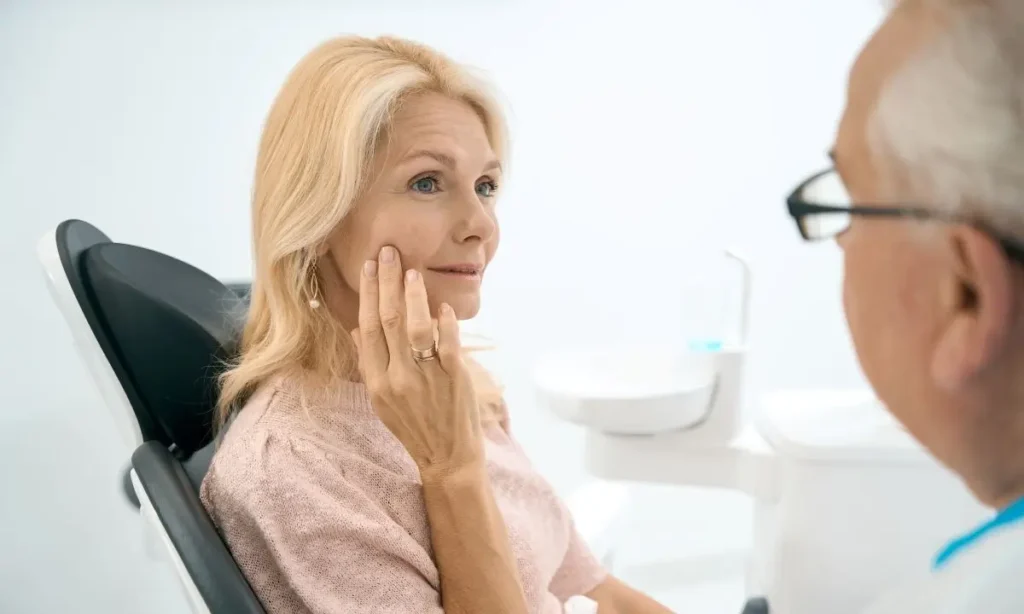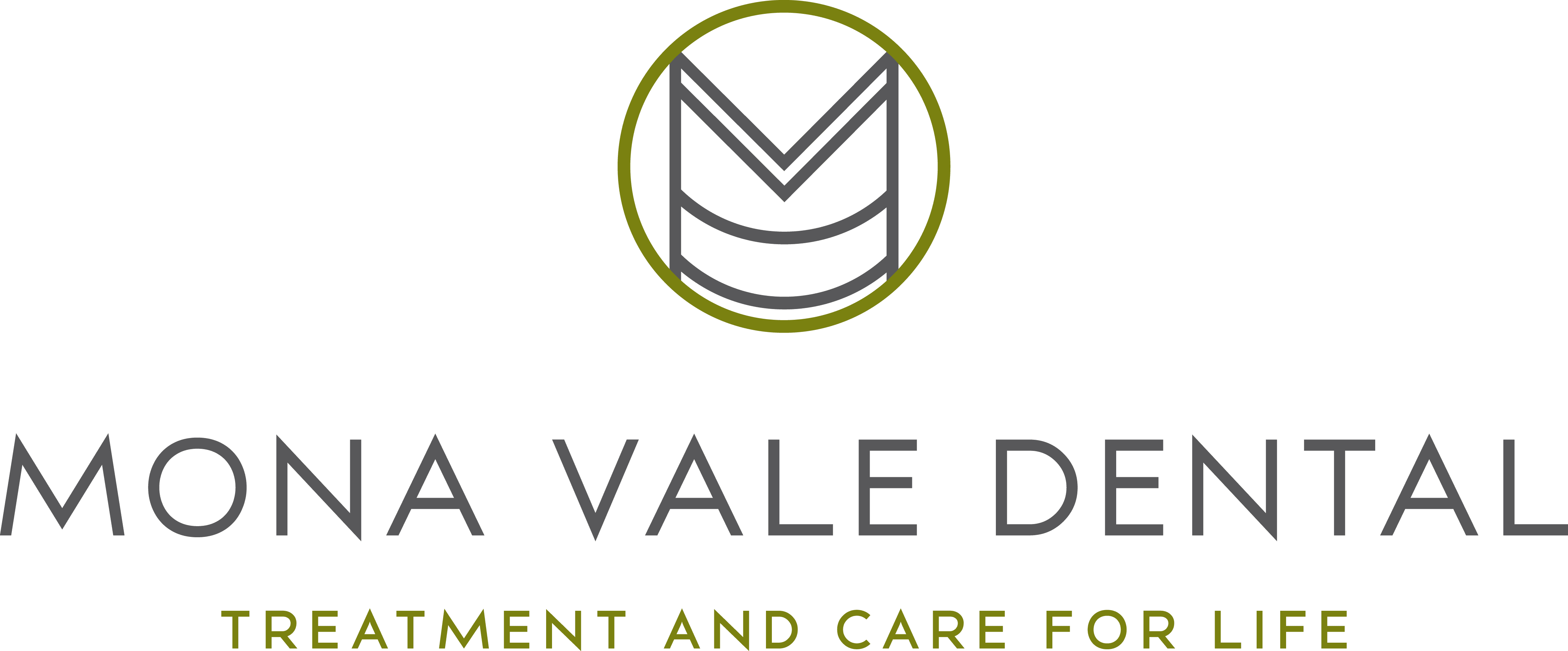Yes, it can.
There’s a strong connection between menopause and oral health complications, due to natural hormonal changes that occur when a woman approaches the end of her reproductive years. You probably associate this transition with hot flashes and muscle aches.
There’s far less awareness about menopause-related oral health problems, even though these are widespread. A UK study shows that up to half of all menopausal women present with symptoms in their oral cavity (we can assume a similar pattern in Australia).
Concerningly, if left untreated, these symptoms can lead to permanent tooth loss and bone degradation. I’ve treated many patients who take good care of their oral health, but still develop tooth pain, bleeding gums, and other symptoms when their estrogen levels drop. Dentists like myself are often the first to notice the tell-tale signs of menopause during examinations.
Most patients are surprised when I explain their teeth and gums are particularly vulnerable to hormonal changes during menopause and just before it begins. They don’t usually hear this information from pregnancy-related health professionals, who are generally unaware of the link between menopause and oral health complications.
There needs to be more awareness on all levels, so women know to take extra steps to protect their teeth and gums during menopause. Keep reading to find out about common problems like bleeding gums during menopause. We also explain how to look after your oral health during this natural transition in your life.
Different Stages of Menopause That Could Impact Oral Health

Menopause is a natural process that occurs when a woman’s body prepares to stop producing eggs. Most women experience this transition between the ages of 45 and 55, for a period of seven to 14 years.
The mouth contains many cells that rely on estrogen to function optimally and produce saliva. As estrogen levels drop during perimenopause and menopause, it becomes harder for the oral cavity to maintain a healthy balance between beneficial and harmful bacteria. Bad bacteria is more likely to accumulate, without adequate levels of saliva to wash it away. Lower levels of estrogen can also restrict blood flow to the gums and cause problems with bone density.
There are three stages:
- Perimenopause usually begins when the ovaries slowly produce less estrogen during a woman’s forties. There’s an accelerated drop in estrogen in the year or two before menopause, which often causes noticeable symptoms.
- Menopause is characterised by a cessation of menstrual periods (diagnosed over 12 consecutive months). The ovaries have stopped releasing eggs, and estrogen levels are far lower now.
- Postmenopause occurs after you haven’t had your period for 12 consecutive months and lasts for the rest of your life. Ovary estrogen production is at the lowest level. Your body now finds different ways to produce estrogen, like via fat tissue.
How Does Menopause Affect Teeth and Gums? (Symptoms)

“My gums were inflamed and there were signs they were starting to recede. I also noticed my mouth became unbearably dry. I was waking up several times in the night gasping for a drink, which left me exhausted. When I drank a bit too much coffee, I’d get this strange metallic, bitter flavour.” Eileen Adamson quoted in the Daily Mail.
Examples of oral health symptoms that can be related to menopause:
- Tooth sensitivity to hot or cold foods and drinks
- Sore, inflamed, or bleeding gums (menopausal gingivostomatitis)
- Food tastes different (bitter, metallic, or too salty, peppery or sour)
- Dry mouth
- Burning mouth
- Mouth ulcers
- Cavities
- Loose teeth
- Bad breath
- Chewing is painful
- Biting challenges
- Receding gums
- White patches on the tongue or cheeks (oral thrush)
- Burning throat
- Problems swallowing
Most Common Menopause-Related Oral Health Conditions
Dry Mouth:
This common symptom occurs in 45% of healthy menopausal women, according to a study of 154 people. There’s a higher risk of cavities and periodontal disease developing, as a result of lower moisture levels in the mouth. A dry mouth can also cause some challenges with chewing, swallowing, and even speaking. Drinking more water, limiting caffeine, and chewing sugar-free gum are a few home remedies that can help stimulate the production of saliva.
Tooth Sensitivity:
Do you wince when you consume something hot or cold? Tooth sensitivity occurs when the inner layer of your tooth loses its protective enamel, leaving the internal nerves vulnerable to pain. When estrogen levels drop, the lining of the mouth may also thin and bones in the oral cavity can become more sensitive. This increases the risk of injury.
Gum Inflammation:
If your gums are red, shiny, sore, or bleed when brushing, you may have menopausal gingivostomatitis or gingivitis. This is easy for dentists to treat if caught early but can progress to severe gum infection (periodontitis) and tooth loss if you do nothing about it.
Taste Bud Changes:

It’s possible the foods you used to enjoy may taste metallic, salty, or bitter for a while. This happens when the oral tissue becomes drier due to low saliva levels. Some people find that using plastic, bamboo, glass, or ceramic utensils and cookware rectifies this.
Burning Mouth Syndrome (BMS):
This uncomfortable condition affects the oral mucosa, causing a burning or tingling sensation in the mouth. It can also create tenderness, numbness, or pain. Symptoms may develop gradually or rapidly, affecting multiple parts of the mouth (but mainly the tip of the tongue). Treatment depends on what the underlying cause is. There are several medications available, so it’s essential to see your doctor or dentist as soon as possible.
Oral Thrush:
Fluctuating hormone levels can lead to an overgrowth of the fungus Candida albicans, which creates unpleasant symptoms, such as:
- White raised patches inside the oral cavity
- Sore throat
- Difficulty swallowing
- Redness in and around the mouth
- Loss of taste
Symptoms may be alleviated by rinsing with warm salt water and brushing and flossing twice daily, but it’s important to consult with your dentist in case you need anti-fungal medication, too.
Treatment and Preventative Care

If you notice any changes in your mouth, please book an appointment with your dentist as soon as possible. Early dental intervention can reverse or manage many of the symptoms before they become more difficult (and expensive) to treat.
Dental treatment depends on the specific condition. Many menopause-related oral symptoms can be treated with a deep cleaning treatment and prescribed medication before the situation worsens. In serious cases, surgery may be required to treat the repercussions of widespread oral infection.
In Terms of Prevention:
It’s important to visit your dentist at least once a year to undergo an examination that picks up early warning signs. Your dentist will also deep clean any hard-to-reach places. Please also continue taking measures to look after your oral hygiene:
- Clean teeth and gums every morning and night
- Floss once a day
- Stay on top of your water intake
- Chew sugar-free gum to stop your mouth from getting dry
- Alcohol in moderation (or none at all)
- Don’t take recreational drugs
Hormone Therapy:
It’s worth noting that hormone therapy has been shown to ease menopausal symptoms. One 2017 study found that women receiving hormone therapy (containing estrogen) were 44% less likely to experience severe gum disease (periodontitis) than women in the non-treatment group.
However, in some cases, HRT has been associated with serious side effects, so it’s crucial to discuss this with your doctor. There’s also some controversy around how effective hormone therapy is for alleviating oral health symptoms. At any rate, more research is needed, as there have been limited studies into the impact of menopause on oral health.
Mona Vale Dental Offers Care for Teeth & Gums in Menopause

We show you how to adapt your daily routine to protect your oral health during this transition in your life. Our team is also experienced in treating all oral health complications related to menopause.
At our Northern Beaches clinic, we do everything we can to provide the best care and help our patients feel comfortable. If you’re anxious about getting treatment, we even offer safe and gentle sedation options.
Fill out this contact form or call our team on (02) 9997 1100 to book an appointment or find out more.


